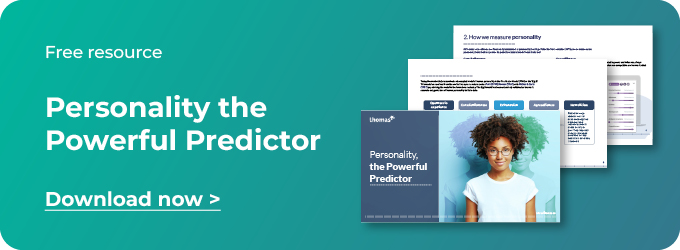When it comes to understanding personality, there is something called “the five big traits.” The commonly used acronym, OCEAN highlights all five which include, Openness, Conscientiousness, Extroversion, Agreeableness and Neuroticism.
Being able to understand all five personality traits and how this can affect a workplace environment as well as your organisational goals is important for employers and recruiters. Agreeableness is widely regarded as the trait that is seen as the most effective in establishing relationships and making friends more easily.
In today’s guide we will be taking a look at agreeableness as a personality trait. We will discuss how agreeableness affects workplace environments, the advantages of agreeableness and how the Thomas workplace personality assessment can help you identify and measure agreeableness in candidates and employees.
What is agreeableness?
Agreeableness is a personality trait that describes a person’s ability to put others needs before their own. Those who are more agreeable are more likely to be empathetic and find pleasure in helping others and working with people who need more help.
Commonly used to describe the level of friendliness, kindness and even politeness a person displays, agreeableness is one of the five traits that make up the big five personality model. Agreeable people are generally well-liked and prefer cooperation over conflict and scoring high in agreeable tendencies also means that you have an ability to maintain relationships.
Whilst being agreeable is widely considered to be a good thing, it can lead to its own unique issues. Being too agreeable can make taking criticism quite difficult, asserting yourself or making tough decisions can also be problematic in the course of your professional and personal life. One of the main concerns with overly agreeable people is that they struggle to progress in their professional careers because they are too concerned with others progressing, placing themselves in the background of what could be a positive step forwards.
Like with the other personality traits, agreeableness can impact individuals in the workplace as well as the workplace environment. Depending on the sector where you work you may require more agreeable personalities in order to deliver a product or service that meets the needs of the sector.

Characteristics of agreeable personalities
We will all encounter an agreeable person in our lives. Like with other personality traits, agreeableness works on a sliding scale from highly agreeable to low agreeableness. We will look at a few of the sub-traits of both high and low agreeableness.
High agreeableness
- Polite
Being polite or exhibiting politeness is a common characteristic of agreeableness. This may be from the way you speak on the phone to someone to engaging in conversation with strangers.
- Considerate
Showing empathy and consideration for others is again, a common characteristic. Understanding how someone else is feeling and considering how the actions of others or yourself can contribute to that person or group of people is common.
- Trusting
Highly agreeable people are prone to assume that others mean well and have good intentions. They are less likely to judge others or make snap decisions about people choosing to show compassion and kindness in abundance.
- Cooperative
Often seen as peacemakers over those that like confrontation and disruption. Highly agreeable people will often compromise their own needs for others.
- Modest
This is also very common, where agreeable individuals are very down to earth and humble.
Low agreeableness
- Abrasive
Showing a lack of patience with people or even snapping on basic requests is common with individuals who score low on agreeableness.
- Argumentative
Preferring confrontation over cooperation, someone who scores low agreeableness will even be very aggressive towards others in order to get what they want.
- Critical
Rather than taking the time to praise a person’s work or someone’s home, low agreeability is common with those who like to criticise and single out opportunities to do so as well.
- Condescending
Taking little to no time to consider others, when in the company of other people, low agreeableness can come across as condescending in discussion or even directly as a response mechanism.
- Selfish
Low agreeable individuals commonly have selfish tendencies. Supporting others is very low on their list of priorities.
How agreeableness influences behaviour in the workplace
When it comes to this personality trait, one of the main areas where agreeableness applies the most as an advantage is in a leadership capacity. This may be someone who is already a leader in their role or you may note (through assessment) how agreeable an individual is to put them on the path to leadership.
Highly agreeable individuals can make great leaders and the characteristics of a great leader are mirrored in the characteristics of high agreeability. What are these characteristics?
Altruistic
Altruism has always played an important role in leadership. Being able to put the needs of others before your own is a strength. Identifying where you can help someone and then going all out to do so enables others to get on with the job that they can do to the best of their ability.
Cooperative
Rather than finding confrontation in matters, cooperation in resolving issues and helping people to achieve their goals is again, a key characteristic of a highly agreeable individual.
Trusting
Being able to see the best in people over casting quick judgements is of course a leadership skill as well as a characteristic. If people feel trusted, they will respond better to goals and deadlines than if their work is being criticised or if there appears to be a considerable amount of distrust.
Considerate
Being considerate of your teams, your bosses and even your own needs is a strong sign of leadership. It shows that you are listening and taking the necessary actions to ensure that people are happy and progressing with their tasks.
Whilst it is good to see this mirroring of characteristic and leadership skills, being highly agreeable can sometimes be a weakness as well. It depends on the circumstances and the sector you are working in. For example, being altruistic is a positive trait but when it comes to putting your own needs first, a highly agreeable person will rarely do so. Being cooperative is again a positive however, sometimes you need to take difficult decisions and confront people over their poor behaviour or results.
What are the benefits of agreeable personalities
When it comes to hiring an agreeable person, there are some benefits that will apply to the workplace. These benefits include:
Strong interpersonal skills
Establishing friendships in a short space of time and then maintaining them. Highly agreeable people like cooperation and rarely going to fall out with someone over trivial matters. This provides stability in the workplace.
Great teamworkers - liked by coworkers
Being able to be at the service of others when there is an issue or when something needs completing is better served by a highly agreeable person. One of the other aspects of this trait is that co-workers like that person for a variety of reasons and not just for pure altruism.
High resilience
Highly agreeable personalities are also highly resilient. They will find ways to get jobs completed because they are putting the needs of others first. This needs to be managed where someone can end up picking up all the slack on a project because of other individuals not pulling their weight.
When combined with conscientiousness (another of the big 5) - great for career progression
Being both highly aware of the role and people is a massive tick in the box for workplace progression. Matching organisational skills along with an ability to empathise and contribute through cooperative behaviours is a positive step forwards for those looking to move up the corporate ladder.

How employers can help to develop those with agreeable personalities
Employees with agreeable personalities show empathy to others, assist others when in need of help and enjoy contributing to the happiness of others. In short, this makes them great candidates for management or playing a bigger role within a team. To make the most of these personalities, it is wise to develop their skills in these areas. By developing their management skills, in line with their naturally agreeable personality, you can see an increase in productivity within your team.
Using their innate strengths, you can help develop and teach them how to use them from a business perspective, to maximise both their potential and the potential of the company. To enable this, you can support employees with agreeable personalities through:
- Training programmes
- Collaborative opportunities
- Giving them greater responsibilities within a team or the office
- Allowing them to lead a project
- Setting out a clear career progression path for them
How Thomas assessments measure workplace personality
Using the globally recognised and respected big 5 psychological theory Thomas' workplace personality assessment can be used to understand a candidate or employees level of agreeableness, and wider personality. Also known as the High Potential Trait Indicator (HPTI), it can be used to identify leadership potential.
The big five personality traits cover Openness, Conscientiousness, Extroversion, Agreeableness, and Neuroticism and present results in an easy to understand format that can give insight into a candidate’s suitability for a role.
Developed by Ian MacRae and Adrian Furnham in 2006, the HPTI has been designed based on an ‘optimality’ model, which assumes that personality traits can be considered ‘optimal’ based on the requirements of a particular job role or position, such as senior executive leadership.
Whether you are looking for the next superstar to join your team, possibly even start to change team dynamics or you want to measure the level of conscientiousness in your workplace, the HPTI assessment can analyse all the data in one place giving you insight in minutes.
In summary
Agreeableness is a personality trait that describes a person’s ability to put others needs before their own. Being empathetic and finding pleasure in helping others and working with people who need more help is a particular strength of highly agreeable individuals.
Whilst it is widely considered a strength to be highly agreeable, it must also be managed correctly as other individuals can take advantage of this good nature.
Thought of as one of the more desirable characteristics in the workplace, when coupled with high level conscientiousness, an individual can be a potential great leader.





